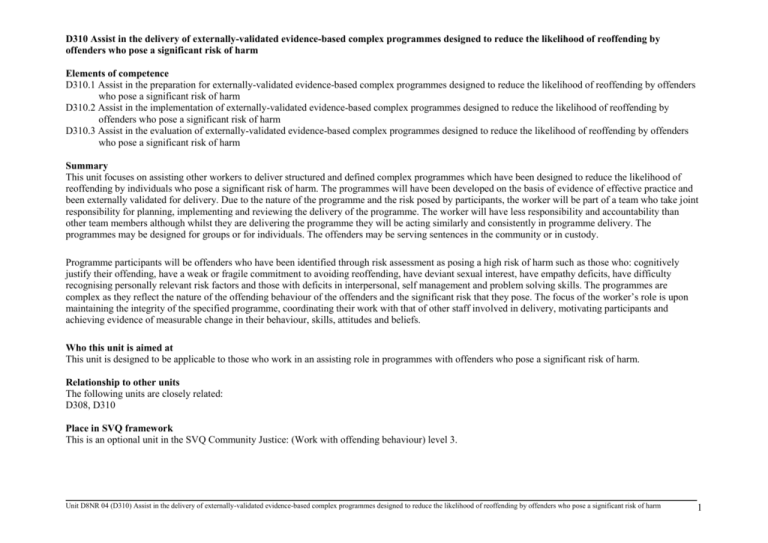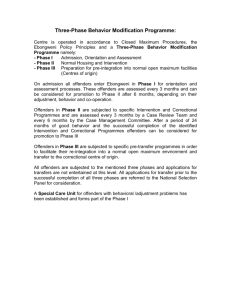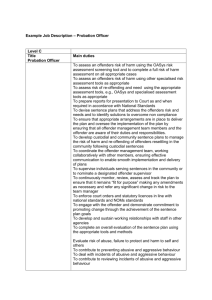Elements of competence
advertisement

D310 Assist in the delivery of externally-validated evidence-based complex programmes designed to reduce the likelihood of reoffending by offenders who pose a significant risk of harm Elements of competence D310.1 Assist in the preparation for externally-validated evidence-based complex programmes designed to reduce the likelihood of reoffending by offenders who pose a significant risk of harm D310.2 Assist in the implementation of externally-validated evidence-based complex programmes designed to reduce the likelihood of reoffending by offenders who pose a significant risk of harm D310.3 Assist in the evaluation of externally-validated evidence-based complex programmes designed to reduce the likelihood of reoffending by offenders who pose a significant risk of harm Summary This unit focuses on assisting other workers to deliver structured and defined complex programmes which have been designed to reduce the likelihood of reoffending by individuals who pose a significant risk of harm. The programmes will have been developed on the basis of evidence of effective practice and been externally validated for delivery. Due to the nature of the programme and the risk posed by participants, the worker will be part of a team who take joint responsibility for planning, implementing and reviewing the delivery of the programme. The worker will have less responsibility and accountability than other team members although whilst they are delivering the programme they will be acting similarly and consistently in programme delivery. The programmes may be designed for groups or for individuals. The offenders may be serving sentences in the community or in custody. Programme participants will be offenders who have been identified through risk assessment as posing a high risk of harm such as those who: cognitively justify their offending, have a weak or fragile commitment to avoiding reoffending, have deviant sexual interest, have empathy deficits, have difficulty recognising personally relevant risk factors and those with deficits in interpersonal, self management and problem solving skills. The programmes are complex as they reflect the nature of the offending behaviour of the offenders and the significant risk that they pose. The focus of the worker’s role is upon maintaining the integrity of the specified programme, coordinating their work with that of other staff involved in delivery, motivating participants and achieving evidence of measurable change in their behaviour, skills, attitudes and beliefs. Who this unit is aimed at This unit is designed to be applicable to those who work in an assisting role in programmes with offenders who pose a significant risk of harm. Relationship to other units The following units are closely related: D308, D310 Place in SVQ framework This is an optional unit in the SVQ Community Justice: (Work with offending behaviour) level 3. Unit D8NR 04 (D310) Assist in the delivery of externally-validated evidence-based complex programmes designed to reduce the likelihood of reoffending by offenders who pose a significant risk of harm 1 D310 Assist in the delivery of externally-validated evidence-based complex programmes designed to reduce the likelihood of reoffending by offenders who pose a significant risk of harm Evidence Requirements for this unit You must provide your assessor with evidence for all the Performance Criteria and all aspects of Range and Knowledge. The evidence may be provided in the following ways, taking account of any Special Considerations which may be noted below: Special Considerations The candidate’s package of evidence from their performance needs to cover all the performance criteria and all of the aspects of range, except those detailed below. If performance evidence is not available during the assessment period, evidence from knowledge and understanding can be used for these performance criteria and aspects of the range: D310.1, performance criterion 5 and D310.2, performance criterion 12: if such situations do not arise during the assessment period, the worker can provide evidence through case studies, answering a series of "what if" questions or from work that they have done in the past D310.3, range 2: 2 of the 4 problems. In order to meet the evidence requirements, it is likely that a candidate would need to gather evidence from work in relation to more than one programme or the delivery of a programme more than once. The candidate must provide evidence from different sources in order to have their achievement recognised for this unit i.e. evidence must come not only from the candidate or one other source (such as records) but must also be from other people (such as from others who saw the candidate working, minutes from meetings which recorded the candidate’s contributions, etc.). Simulations (such as case studies or role play) can be used as one source of performance evidence for this unit. Evidence from real practice must, however, form the majority of the candidate’s performance evidence. Assessment Guidance When planning assessment, candidates should consider how they may best use evidence across a number of units. Evidence from the following units may be particularly relevant to this unit: D301 Help individuals address their offending behaviour (D01) D306 Reinforce positive behavioural goals during relationships with individuals D308 Deliver externally-validated evidence-based programmes designed to reduce the likelihood of reoffending by offenders who pose a medium to low risk of harm F306 Contribute to the development and effectiveness of work teams (E05)(Care CU9) F403 Develop and sustain effective working relationships with staff in other agencies (E01) Unit D8NR 04 (D310) Assist in the delivery of externally-validated evidence-based complex programmes designed to reduce the likelihood of reoffending by offenders who pose a significant risk of harm 2 D310 Assist in the delivery of externally-validated evidence-based complex programmes designed to reduce the likelihood of reoffending by offenders who pose a significant risk of harm Assessment Guidance Candidates may wish to use these sources of evidence (for performance and for knowledge and understanding) the products of their work (eg working notes and records of work session, reports produced by the candidate as part of the monitoring and evaluation process, video or audio recordings of programme activities) notes and drafts used as stages in the development of products notes and minutes of meetings evidence from others who worked with the candidate records and correspondence their reflective practice journal workplace projects observation by an assessor who is observing the candidate specifically for assessment purposes verbal or written responses to questions put by an assessor. Unit D8NR 04 (D310) Assist in the delivery of externally-validated evidence-based complex programmes designed to reduce the likelihood of reoffending by offenders who pose a significant risk of harm 3 D310 Assist in the delivery of externally-validated evidence-based complex programmes designed to reduce the likelihood of reoffending by offenders who pose a significant risk of harm Element D310.1 Assist in the preparation for externally-validated evidence-based complex programmes designed to reduce the likelihood of reoffending by offenders who pose a significant risk of harm Performance criteria DO P Type of evidence ─ state evidence index no(s) W RA Q Other Date 1. confirm with other team members who are involved in delivering the programme a) the roles and responsibilities of each of the team members b) the nature of the offenders who have been allocated to the programme c) the risk of harm which the offenders pose d) the nature of the behaviour which the offenders exhibit and how this can best be managed e) the methods and approaches to be used in the programme f) the goals and objectives for the programme as a whole g) objectives of each programme session h) who is to do what and by when to prepare for programme delivery i) the different activities each will lead 2. undertake agreed tasks in an effective manner by the agreed date 3. communicate and interact with offenders and other workers in a manner which a) is appropriate to them b) is consistent with the values and goals of the programme c) encourages an open exchange of views and information d) minimises any constraints to communication e) is free from discrimination and oppression f) encourages their motivation Unit D8NR 04 (D310) Assist in the delivery of externally-validated evidence-based complex programmes designed to reduce the likelihood of reoffending by offenders who pose a significant risk of harm 4 D310 Assist in the delivery of externally-validated evidence-based complex programmes designed to reduce the likelihood of reoffending by offenders who pose a significant risk of harm Element D310.1 Assist in the preparation for externally-validated evidence-based complex programmes designed to reduce the likelihood of reoffending by offenders who pose a significant risk of harm Performance criteria DO P Type of evidence ─ state evidence index no(s) W RA Q Other Date 4. seek advice and support promptly when team discussion and supervision are appropriate 5. report promptly to the lead member of the team any concerns regarding the programme and offenders allocated to the programme. Unit D8NR 04 (D310) Assist in the delivery of externally-validated evidence-based complex programmes designed to reduce the likelihood of reoffending by offenders who pose a significant risk of harm 5 D310 Assist in the delivery of externally-validated evidence-based complex programmes designed to reduce the likelihood of reoffending by offenders who pose a significant risk of harm Element D310.1 Assist in the preparation for externally-validated evidence-based complex programmes designed to reduce the likelihood of reoffending by offenders who pose a significant risk of harm Range DO P Type of evidence ─ state evidence index no(s) W RA Q Other Date 1. Risk of harm to a) the individual offender participating in the programme b) other offenders participating in the programme c) people significant to offenders d) the worker and other staff involved in programme delivery e) the community as a whole. 2. Communicate through a) speech and language b) actions, gestures and body language c) space and position Unit D8NR 04 (D310) Assist in the delivery of externally-validated evidence-based complex programmes designed to reduce the likelihood of reoffending by offenders who pose a significant risk of harm 6 D310 Assist in the delivery of externally-validated evidence-based complex programmes designed to reduce the likelihood of reoffending by offenders who pose a significant risk of harm Element D310.2 Assist in the implementation of externally-validated evidence-based complex programmes designed to reduce the likelihood of reoffending by offenders who pose a significant risk of harm Type of evidence — state evidence index no(s) Performance criteria DO P W RA Q Other 1. discuss and review with other team members immediately before each session a) the session's aims and specified activities and the relationship of these to the overall programme b) each team member’s role and responsibilities in that session c) each offender and how they may behave in the session d) the risk of harm which each offender poses e) each offender’s participation and progress and particular issues which have arisen in the programme to date f) how each offender's behaviour and the risk of harm which they pose can best be managed within the session g) and agree any steps which will be taken to improve programme delivery and integrity in future sessions 2. communicate and interact with other team members in a manner which a) is appropriate to them b) is consistent with their joint responsibilities in the programme c) encourages an open exchange of views and information d) minimises any constraints to communication e) is free from discrimination and oppression f) enables their work to be coordinated effectively and consistently given their respective roles and responsibilities Unit D8NR 04 (D310) Assist in the delivery of externally-validated evidence-based complex programmes designed to reduce the likelihood of reoffending by offenders who pose a significant risk of harm Date 7 D310 Assist in the delivery of externally-validated evidence-based complex programmes designed to reduce the likelihood of reoffending by offenders who pose a significant risk of harm Element D310.2 Assist in the implementation of externally-validated evidence-based complex programmes designed to reduce the likelihood of reoffending by offenders who pose a significant risk of harm Type of evidence — state evidence index no(s) Performance criteria DO P W RA Q Other 3. communicate and interact with offenders in a manner which a) is appropriate to them b) is consistent with the values and goals of the programme c) encourages an open exchange of views and information d) minimises any constraints to communication e) is free from discrimination and oppression f) models socially-desirable behaviour and communication g) does not collude with anti-social behaviour or procriminal behaviour h) stimulates each offender to participate fully in the programme 4. use the specified activities and techniques in ways which a) are consistent with the programme manual b) encourage the active participation of offenders c) manage the risk of harm posed by each of the offenders d) promote anti-discriminatory practice e) reinforce and reward attendance and participation 5. observe and monitor offenders’ behaviour throughout programme activities and offer offenders constructive feedback on their participation and progress in a manner designed to sustain their motivation and enhance their learning Unit D8NR 04 (D310) Assist in the delivery of externally-validated evidence-based complex programmes designed to reduce the likelihood of reoffending by offenders who pose a significant risk of harm Date 8 D310 Assist in the delivery of externally-validated evidence-based complex programmes designed to reduce the likelihood of reoffending by offenders who pose a significant risk of harm Element D310.2 Assist in the implementation of externally-validated evidence-based complex programmes designed to reduce the likelihood of reoffending by offenders who pose a significant risk of harm Performance criteria DO P Type of evidence — state evidence index no(s) W RA Q Other Date 6. maintain a level of discipline and control which enables offenders to learn from the activities and which a) manages the risk of harm b) prevents triggers to their behaviour occurring c) is consistent with their sentences d) maintains appropriate role boundaries e) is consistent with known effective practice, statutory requirements, standards and guidelines f) is consistent with anti-discriminatory practice 7. challenge constructively behaviour and attitudes that are aggressive, abusive or discriminatory while taking account of personal safety 8. take actions to maintain calmness and safety with as little restriction of action as possible and without denying people’s rights 9. manage physically aggressive behaviour by the safest possible methods for the individual, the worker and others and in a manner which is consistent with legal and agency requirements 10. continuously monitor and review their own behaviour, communication and interaction to ensure they are consistently modelling good practice 11. report promptly to the team leader any concerns regarding the programme 12. seek advice and support promptly when team discussion and supervision are appropriate. Unit D8NR 04 (D310) Assist in the delivery of externally-validated evidence-based complex programmes designed to reduce the likelihood of reoffending by offenders who pose a significant risk of harm 9 D310 Assist in the delivery of externally-validated evidence-based complex programmes designed to reduce the likelihood of reoffending by offenders who pose a significant risk of harm Element D310.2 Assist in the implementation of externally-validated evidence-based complex programmes designed to reduce the likelihood of reoffending by offenders who pose a significant risk of harm Range 1. a) b) c) 2. a) b) c) d) e) 3. a) b) c) d) DO P Type of evidence ─ state evidence index no(s) W RA Q Other Date Communicate through speech and language actions, gestures and body language space and position. Risk of harm to the individual offender participating in the programme other offenders participating in the programme people significant to offenders the worker and other staff involved in programme delivery the community as a whole. Actions taken to maintain calmness and safety divert individuals to other activities reasoning and suggestions for other activities preventive action to stop the individual when there is direct risk help sought from other workers. Unit D8NR 04 (D310) Assist in the delivery of externally-validated evidence-based complex programmes designed to reduce the likelihood of reoffending by offenders who pose a significant risk of harm 10 D310 Assist in the delivery of externally-validated evidence-based complex programmes designed to reduce the likelihood of reoffending by offenders who pose a significant risk of harm Element D310.3 Assist in the evaluation of externally-validated evidence-based complex programmes designed to reduce the likelihood of reoffending by offenders who pose a significant risk of harm Performance criteria DO P Type of evidence ─ state evidence index no(s) W RA Q Other Date 1. offer constructive feedback to other team members on their performance and encourage other team members to give constructive feedback on the worker’s performance 2. encourage offenders to provide constructive and realistic feedback on the programme and the extent to which it has assisted them to change their offending behaviour, skills, attitudes and beliefs 3. evaluate their own, and the team’s, effectiveness in delivering programme sessions and use this to inform the future delivery of the programme 4. make complete and accurate records which a) are consistent with the programme manual b) state the part they played in programme delivery and their roles and responsibilities c) state how offenders behaved during the programmes d) identify issues of risk of harm which arose during the programmes and how these were managed e) identify the outcomes of individual sessions f) identify any problems and how they were addressed. Unit D8NR 04 (D310) Assist in the delivery of externally-validated evidence-based complex programmes designed to reduce the likelihood of reoffending by offenders who pose a significant risk of harm 11 D310 Assist in the delivery of externally-validated evidence-based complex programmes designed to reduce the likelihood of reoffending by offenders who pose a significant risk of harm Element D310.3 Assist in the evaluation of externally-validated evidence-based complex programmes designed to reduce the likelihood of reoffending by offenders who pose a significant risk of harm Range DO P Type of evidence ─ state evidence index no(s) W RA Q Other Date 1. Risk of harm to a) the individual offender participating in the programme b) other offenders participating in the programme c) people significant to offenders d) the worker and other staff involved in programme delivery e) the community as a whole. 2. Problems with a) offenders’ behaviour and level of participation b) the suitability of the programme for the offenders c) availability of resources d) the structure and content of the programme. Unit D8NR 04 (D310) Assist in the delivery of externally-validated evidence-based complex programmes designed to reduce the likelihood of reoffending by offenders who pose a significant risk of harm 12 D310 Assist in the delivery of externally-validated evidence-based complex programmes designed to reduce the likelihood of reoffending by offenders who pose a significant risk of harm Knowledge specification for the whole of this unit You must show your assessor that you know and understand the following: Working with offending behaviour State evidence index no(s) 1. the impact of crime on victims, survivors and witnesses and their need for protection, respect, recognition, information and confidentiality; why it is important to recognise the impact on all those affected by crime, whether they are direct victims or indirect victims (eg family, friends or other associates) 2. the ways in which the physical, social, psychological and emotional development and functioning of individuals affects their behaviour and its associated patterns, and the reasons why individuals may develop specific problems; the factors which affect the behaviour of individuals who pose a high risk of harm (eg those who cognitively justify their offending, have a weak or fragile commitment to avoiding reoffending, have deviant sexual interest, have empathy deficits, have difficulty recognising personally relevant risk factors and those with deficits in interpersonal, self management and problem solving skills); the skills which make it easier for individuals to avoid criminal behaviour and engage successfully in legitimate behaviour ie literacy, numeracy, vocational training and employment skills, self-management skills, interpersonal skills, problem solving and other cognitive skills 3. factors which may influence individuals’ motivation and ability to change their behaviour, skills, attitude and beliefs 4. the models which underpin evidence-based programmes to address to address the offending behaviour of individuals who pose a high risk of harm and the purposes of having externally validated programmes; the research evidence on which programmes to tackle the offending behaviour of individuals who pose a high of harm are based and the specific evidence and methods related to the programmes for which the worker is responsible 5. the basis of therapeutic change and how this links to the research and evidence base which is used in the programme; the relationship between the amount, intensity, sequencing and spacing of interventions, the seriousness and persistence of offending and the range and seriousness of factors which affect offending 6. effective methods of working with offenders who pose a medium to low risk of harm in one-to-one and in group settings, in promoting their interest and maintaining control; the different approaches and processes involved in group work and in one-to-one work with offenders to reduce reoffending, including group dynamics, handling issues in groups and methods of encouraging the active involvement of participants in 1-1 programmes and of all members of a group, not just those who are most keen to contribute 7. methods of evaluating the effectiveness of programmes and the activities contained within them, the ways in which the worker can contribute to this; methods of evaluation relevant to programmes designed to enable individuals to change their offending behaviour 8. methods of working effectively with other team members and examples of how they have done this in their own work. Working within the community justice sector 9. the specific legislation, guidelines of good practice, charters and service standards which relate to the work being undertaken and the impact of these on the work. Unit D8NR 04 (D310) Assist in the delivery of externally-validated evidence-based complex programmes designed to reduce the likelihood of reoffending by offenders who pose a significant risk of harm 13 D310 Assist in the delivery of externally-validated evidence-based complex programmes designed to reduce the likelihood of reoffending by offenders who pose a significant risk of harm Knowledge specification for the whole of this unit You must show your assessor that you know and understand the following: Working to improve agency practice State evidence index no(s) 10. 11. the role of the agency and its services and how they relate to other agencies and services in the community justice sector the agency’s policy and procedures regarding confidentiality of information and the disclosure of information to third parties and the specific circumstances under which disclosure may be made. Working to improve individual practice 12. own role and responsibilities and from whom assistance and advice should be sought if the worker is unsure 13. any particular factors relating to the agency’s policies and practices which have affected the work undertaken 14. how they have applied the principles of equality, diversity and anti-discriminatory practice to their work 15. methods of evaluating their own competence, determining when further support and expertise are needed and the measures taken to improve own competence in this area of work. Unit D8NR 04 (D310) Assist in the delivery of externally-validated evidence-based complex programmes designed to reduce the likelihood of reoffending by offenders who pose a significant risk of harm 14 D310 Assist in the delivery of externally-validated evidence-based complex programmes designed to reduce the likelihood of reoffending by offenders who pose a significant risk of harm Type of evidence — state evidence index no(s) Knowledge and understanding DO P W RA Q Other There is sufficient evidence of knowledge and understanding for this unit Evidence requirements DO P Type of evidence — state evidence index no(s) W RA Q Other Date Date The evidence generated by the candidate meets the evidence requirements for this unit Assessor/Internal verifier comments Candidate’s name Assessor’s name IV’s name Candidate’s signature Assessor’s signature IV signature Date Date Date Unit D8NR 04 (D310) Assist in the delivery of externally-validated evidence-based complex programmes designed to reduce the likelihood of reoffending by offenders who pose a significant risk of harm 15








